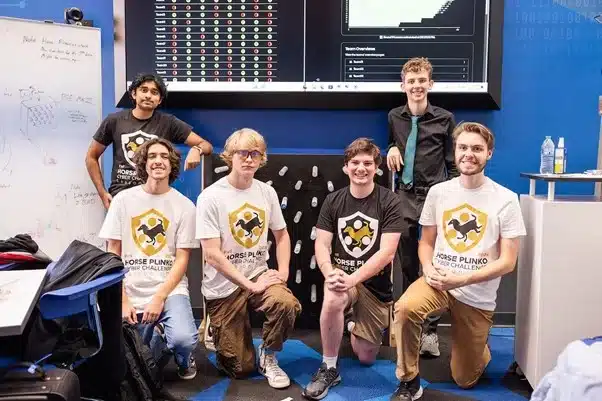At the University of Central Florida (UCF), students have discovered a fun yet formidable way to sharpen their cybersecurity skills: a competition called Horse Plinko. While the name may sound like a joke—a nod to a meme of a horse falling through a plinko board—the experience it provides is anything but trivial.
Created by Hack@UCF and the UCF Collegiate Cybersecurity Competition Team (C3), Horse Plinko allows students to simulate defending a company from a real-time cyberattack.
What is the Horse Plinko Cyber Competition?
Earlier this month, the second Horse Plinko Cyber Competition attracted more than 160 participants, making it one of the university’s most highly anticipated cybersecurity events. For many students, the contest is their first exposure to hands-on cyber defense, a chance to practice what textbooks can’t fully teach: how to react under the pressure of a live cyberattack.
Harrison Keating, the competition’s director and a cybersecurity master’s student at UCF, explains the real-world application of Horse Plinko. “We simulate a business network for teams to defend, and we pit them against live attackers attempting, and often succeeding, to hack into their network,” he says. “That’s an experience many of them won’t get again until they’re out working in the field.”
Motive Behind the Horse Plinko Cyber Competition
Participants in the competition, affectionately dubbed “plinkterns,” take on the role of cybersecurity interns working for the fictional International Horse Plinko League. Their mission? To protect the company’s critical services from a barrage of cyberattacks over six hours. Teams must quickly identify threats, strengthen defenses, and keep the company running. It’s a race against time and the attackers, with plenty of high-stakes moments along the way.
Yet, despite the tension that comes with defending a company’s digital infrastructure, Horse Plinko’s organizers have worked hard to ensure the event remains approachable, especially for beginners. The quirky name, light-hearted atmosphere, and running jokes throughout the competition help ease the nerves of first-time competitors.
Keating, who is also the captain of UCF’s Collegiate Cybersecurity Competition team, emphasizes that this blend of serious work and fun is intentional. “We have a LinkedIn profile and website for the fictional company, there are recurring characters that appear during the competition, and we throw in a lot of humor,†he says. “It’s important to keep things light to make it more approachable for new students.”
But make no mistake—beneath the laughs, Horse Plinko is a serious learning experience. Cybersecurity is a highly collaborative field, and the competition is structured to reflect that. Keating highlights that it’s not just technical skills that are honed during the event. “Cybersecurity is all about teamwork and communication,” he says. “Horse Plinko gives students a chance to practice working together in high-pressure situations, and they learn a lot from each other.”
First-time competitor Muhammad Ali, a freshman majoring in computer science, found the event particularly eye-opening. Ali had always been more interested in “red team” activities—offensive cybersecurity or ethical hacking—and wasn’t sure if he was cut out for defending a network. But Horse Plinko changed his perspective.
“It’s a different story when you’re tasked with defending against a whole squad of live red team hackers trying to take your services down,†Ali says. “It’s a lot of fun, and it really pushed me.â€
Winners
For Ali, the competition not only offered him a challenging experience but also helped him overcome feelings of self-doubt. Despite his obvious interest in cybersecurity—he recalls hacking into his dad’s computer at the age of nine—he has struggled with imposter syndrome. “I feel like I’m not good enough for cybersecurity sometimes,” Ali admits. “But Horse Plinko, and UCF in general, have given me a lot of self-confidence.”
His team placed second in the competition, and he’s now preparing for two more cyber competitions out of state. He’s also planning to return to Horse Plinko next year—this time, as an attacker on the red team. “I never thought I’d enjoy it this much,†Ali says. “I’m 100% doing this again. If you’re new to cybersecurity, Horse Plinko is the best place to get first-hand experience.â€
Horse Plinko’s accessibility is a big part of its success. Unlike many cyber competitions that require a high level of expertise, Horse Plinko is designed for students of all skill levels. Organizers have intentionally built the competition to be inclusive, giving anyone with an interest in cyber defense the chance to participate. “Our club has over 350 members, but only eight get to compete in the National College Cyber Defense Competition,” Keating explains. “Our goal with Horse Plinko is to give as many students as possible the chance to experience what it’s like to defend a network from a live attack.”
Horse Plinko’s continued growth is made possible by the support of the UCF C3 team and Hack@UCF, with previous competitors often returning to help run future events. This sense of community and shared learning is one of the competition’s most valuable aspects, according to Keating. “It’s not just about the technical side of things. It’s about building a network of peers and mentors who can help each other along the way.”
As the competition continues to grow, Horse Plinko is proving to be more than just a fun event. It’s an innovative training ground for the next generation of cyber professionals—one where students can laugh, learn, and prepare for the high-stakes challenges they’ll face in their future careers.
Source: Read More


